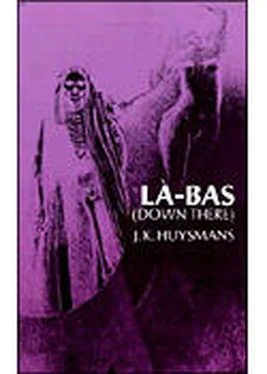Joris-Karl Huysmans - Down There (Là-Bas)
Здесь есть возможность читать онлайн «Joris-Karl Huysmans - Down There (Là-Bas)» весь текст электронной книги совершенно бесплатно (целиком полную версию без сокращений). В некоторых случаях можно слушать аудио, скачать через торрент в формате fb2 и присутствует краткое содержание. Жанр: Классическая проза, на английском языке. Описание произведения, (предисловие) а так же отзывы посетителей доступны на портале библиотеки ЛибКат.
- Название:Down There (Là-Bas)
- Автор:
- Жанр:
- Год:неизвестен
- ISBN:нет данных
- Рейтинг книги:3 / 5. Голосов: 1
-
Избранное:Добавить в избранное
- Отзывы:
-
Ваша оценка:
- 60
- 1
- 2
- 3
- 4
- 5
Down There (Là-Bas): краткое содержание, описание и аннотация
Предлагаем к чтению аннотацию, описание, краткое содержание или предисловие (зависит от того, что написал сам автор книги «Down There (Là-Bas)»). Если вы не нашли необходимую информацию о книге — напишите в комментариях, мы постараемся отыскать её.
Down There (Là-Bas) — читать онлайн бесплатно полную книгу (весь текст) целиком
Ниже представлен текст книги, разбитый по страницам. Система сохранения места последней прочитанной страницы, позволяет с удобством читать онлайн бесплатно книгу «Down There (Là-Bas)», без необходимости каждый раз заново искать на чём Вы остановились. Поставьте закладку, и сможете в любой момент перейти на страницу, на которой закончили чтение.
Интервал:
Закладка:
"Near Châlons," said Durtal, digging in his memory, "it does seem to me now that Des Hermies, speaking of bewitchment by the blood of white mice, pointed out that village as the habitation of certain diabolic circles."
"Yes, that country in all times has been a hotbed of Satanism."
"You are mighty well up on these matters. Is it Docre who transmitted this knowledge to you?"
"Yes, I owe him the little I am able to pass on to you. He took a fancy to me and even wanted to make me his pupil. I refused, and am glad now I did, for I am much more wary than I was then of being constantly in a state of mortal sin."
"Have you ever attended the Black Mass?"
"Yes. And I warn you in advance that you will regret having seen such terrible things. It is a memory that persists and horrifies, even-especially-when one does not personally take part in the offices."
He looked at her. She was pale, and her filmed eyes blinked rapidly.
"It's your own wish," she continued. "You will have no complaint if the spectacle terrifies you or wrings your heart."
He was almost dumbfounded to see how sad she was and with what difficulty she spoke.
"Really. This Docre, where did he come from, what did he do formerly, how did he happen to become a master Satanist?"
"I don't know very much about him. I know he was a supply priest in Paris, then confessor of a queen in exile. There were terrible stories about him, which, thanks to his influential patronage, were hushed up under the Empire. He was interned at La Trappe, then driven out of the priesthood, excommunicated by Rome. I learned in addition that he had several times been accused of poisoning, but had always been acquitted because the tribunals had never been able to get any evidence. Today he lives I don't know how, but at ease, and he travels a good deal with a woman who serves as voyant. To all the world he is a scoundrel, but he is learned and perverse, and then he is so charming."
"Oh," he said, "how changed your eyes and voice are! Admit that you are in love with him."
"No, not now. But why should I not tell you that we were mad about each other at one time?"
"And now?"
"It is over. I swear it is. We have remained friends and nothing more."
"But then you often went to see him. What kind of a place did he have? At least it was curious and heterodoxically arranged?"
"No, it was quite ordinary, but very comfortable and clean. He had a chemical laboratory and an immense library. The only curious book he showed me was an office of the Black Mass on parchment. There were admirable illuminations, and the binding was made of the tanned skin of a child who had died unbaptized. Stamped into the cover, in the shape of a fleuron, was a great host consecrated in a Black Mass."
"What did the manuscript say?"
"I did not read it."
They were silent. Then she took his hands.
"Now you are yourself again. I knew I should cure you of your bad humour. Admit that I am awfully good-natured not to have got angry at you."
"Got angry? What about?"
"Because it is not very flattering to a woman to be able to entertain a man only by telling him about another one."
"Oh, no, it isn't that way at all," he said, kissing her eyes tenderly.
"Let me go now," she said, very low, "this enervates me, and I must get home. It's late."
She sighed and fled, leaving him amazed and wondering in what weird activities the life of that woman had been passed.
CHAPTER XVIII
The day after that on which he had spewed such furious vituperation over the Tribunal, Gilles de Rais appeared again before his judges. He presented himself with bowed head and clasped hands. He had once more jumped from one extreme to the other. A few hours had sufficed to break the spirit of the energumen, who now declared that he recognized the authority of the magistrates and begged forgiveness for having insulted them.
They affirmed that for the love of Our Lord they forgot his imprecations, and, at his prayer, the Bishop and the Inquisitor revoked the sentence of excommunication which they had passed on him the day before.
This hearing was, in addition, taken up with the arraignment of Prelati and his accomplices. Then, authorized by the ecclesiastical text which says that a confession cannot be regarded as sufficient if it is "dubia, vaga, generalis illativa, jocosa," the Prosecutor asserted that to certify the sincerity of his confessions Gilles must be subjected to the "canonic question," that is, to torture.
The Marshal besought the Bishop to wait until the next day, and claiming the right of confessing immediately to such judges as the Tribunal were pleased to designate, he swore that he would thereafter repeat his confession before the public and the court.
Jean de Malestroit granted this request, and the Bishop of Saint Brieuc and Pierre de l'Hospital were appointed to hear Gilles in his cell. When he had finished the recital of his debauches and murders they ordered Prelati to be brought to them.
At sight of him Gilles burst into tears and when, after the interrogatory, preparations were made to conduct the Italian back to his dungeon, Gilles embraced him, saying, "Farewell, Francis my friend, we shall never see each other again in this world. I pray God to give you good patience and I hope in Him that we may meet again in great joy in Paradise. Pray God for me and I shall pray for you."
And Gilles was left alone to meditate on his crimes which he was to confess publicly at the hearing next day. That day was the impressive day of the trial. The room in which the Tribunal sat was crammed, and there were multitudes sitting on the stairs, standing in the corridors, filling the neighbouring courts, blocking the streets and lanes. From twenty miles around the peasants were come to see the memorable beast whose very name, before his capture, had served to close the doors those evenings when in universal trembling the women dared not weep aloud.
This meeting of the Tribunal was to be conducted with the most minute observance of all the forms. All the assize judges, who in a long hearing generally had their places filled by proxies, were present.
The courtroom, massive, obscure, upheld by heavy Roman pillars, had been rejuvenated. The wall, ogival, threw to cathedral height the arches of its vaulted ceiling, which were joined together, like the sides of an abbatial mitre, in a point. The room was lighted by sickly daylight which was filtered through small panes between heavy leads. The azure of the ceiling was darkened to navy blue, and the golden stars, at that height, were as the heads of steel pins. In the shadows of the vaults appeared the ermine of the ducal arms, dimly seen in escutcheons which were like great dice with black dots.
Suddenly the trumpets blared, the room was lighted up, and the Bishops entered. Their mitres of cloth of gold flamed like the lightning. About their necks were brilliant collars with orphreys crusted, as were the robes, with carbuncles. In silent processional the Bishops advanced, weighted down by their rigid copes, which fell in a flare from their shoulders and were like golden bells split in the back. In their hands they carried the crozier from which hung the maniple, a sort of green veil.
At each step they glowed like coals blown upon. Themselves were sufficient to light the room, as they reanimated with their jewels the pale sun of a rainy October day and scattered a new lustre to all parts of the room, over the mute audience.
Outshone by the shimmer of the orphreys and the stones, the costumes of the other judges appeared darker and discordant. The black vestments of secular justice, the white and black robe of Jean Blouyn, the silk symars, the red woollen mantles, the scarlet chaperons lined with fur, seemed faded and common.
Читать дальшеИнтервал:
Закладка:
Похожие книги на «Down There (Là-Bas)»
Представляем Вашему вниманию похожие книги на «Down There (Là-Bas)» списком для выбора. Мы отобрали схожую по названию и смыслу литературу в надежде предоставить читателям больше вариантов отыскать новые, интересные, ещё непрочитанные произведения.
Обсуждение, отзывы о книге «Down There (Là-Bas)» и просто собственные мнения читателей. Оставьте ваши комментарии, напишите, что Вы думаете о произведении, его смысле или главных героях. Укажите что конкретно понравилось, а что нет, и почему Вы так считаете.












